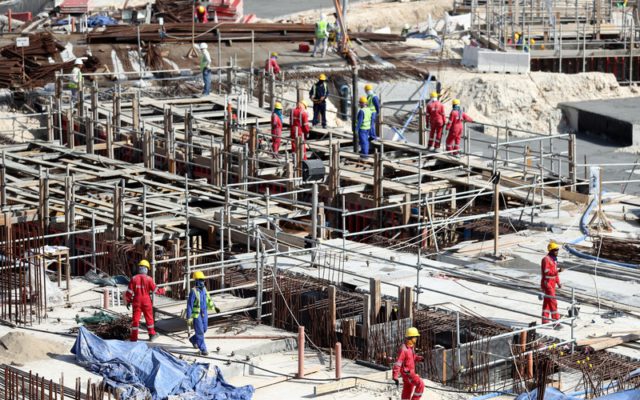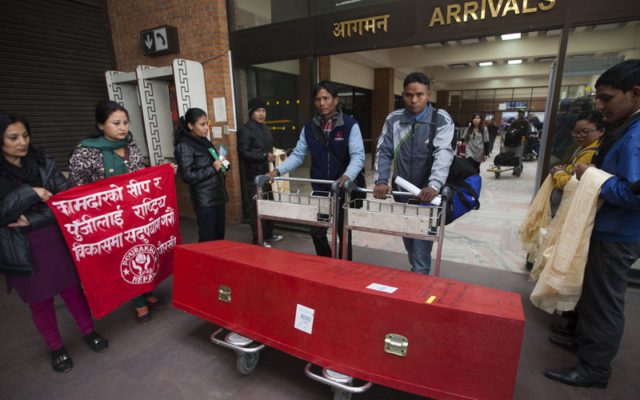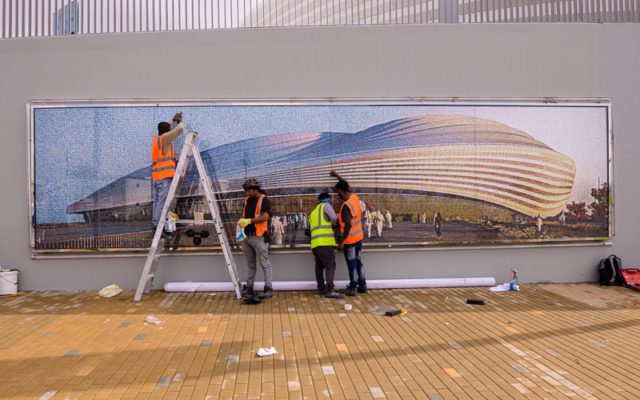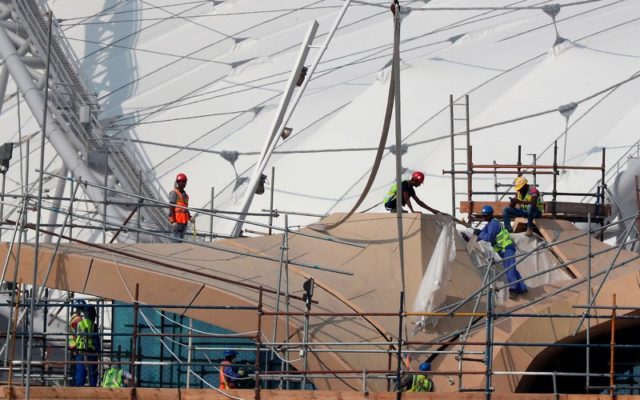Qatar hit the headlines in December 2010 when football’s world governing body FIFA awarded it the right to host the 2022 men’s football World Cup, the first to be held in the Middle East.
It was clear that a global event of this magnitude would mean Qatar would need to deploy immense resources and rely on vast manpower to build new stadiums, roads, hotels and other facilities and infrastructure to cater for football fans from across the globe.
With migrant workers making up more than 90% of the country’s workforce, it was clear that the weight of delivering these projects would rest overwhelmingly on the shoulders of all those who travelled to Qatar in the hope of securing a better livelihood.
Widespread abuse to be compensated, before the World Cup can be celebrated
Every fan is desperate to see their nation compete for a place in history. The thrill of a last-minute winner, the despair of a glaring miss, the suspense of a penalty shoot-out – these are emotions that unite people from every corner of the world. But can our eagerness to support our favourite teams be matched with support for migrant workers making the competition possible
It should have been no secret to anyone that migrant workers in Qatar faced systemic labour abuses and exploitation and that their toil would be essential for the World Cup to take place there. At the heart of the abuse was Qatar’s ‘Kafala’ system of sponsorship-based employment which legally bound foreign workers to their employers, preventing them from changing jobs or even leaving the country without their employer’s permission. Despite this, FIFA granted the multi-billion-dollar tournament to Qatar without imposing on it any conditions to ensure labour protections for migrant workers, despite the foreseeable risk to their human rights. As a result, over the past 12 years, hundreds of thousands of migrant workers hired to build or provide services for projects related to the World Cup have been exploited and otherwise abused.
All our dreams vanished when my brother passed away. He hoped to improve all of our living standards but most of his wages were used to repay the cost of migration.
Didarul Islam, brother of Mohammad Kaochar Khan, 34, from Bangladesh who was found dead in his bed on 15 November 2017 in Qatar.


2013 after a heart attack. © Narendra Shrestha/EPA/Shutterstock
Labour abuse and exploitation in Qatar
For many years, Amnesty International has documented and exposed the labour abuse and exploitation of low-paid migrant workers in the country.
1. Unpaid wages
Wage theft is one of the most common abuses faced by migrant workers. Amnesty International alone has documented cases involving thousands of workers who have not been paid their salary and benefits, or have been underpaid, for months and even years at a time. Having often taken out high-interest loans to pay costly and illegal recruitment fees, such delays can be devastating for workers, particularly when they are supporting not only themselves but families in their home countries.
2. Unexplained deaths of migrant workers
Since 2010, thousands of migrant workers have died suddenly and unexpectedly in Qatar, despite undergoing medical tests before travelling to the country. But even though there is evidence of links between premature deaths and unsafe working conditions, the Qatari authorities have failed to investigate the underlying causes of these deaths. As a result, bereaved families are left not knowing what happened to their loved ones and are denied the possibility of compensation from the employers or the Qatari authorities.
3. Forced labour
Some migrant workers are made to work extremely long hours and are denied rest days, under the threat of having their wages cut. This can amount to forced labour. For example, security guards told Amnesty International that they regularly have to work 12 hours a day, seven days a week without a single day off for months and even years on end. If they take a weekly day off, they risk their employer deducting their wages by up to six days’ pay.
The promise of reform: shortcuts taken on the road to Qatar 2022
Under persistent pressure, Qatar and its World Cup organizing bodies did gradually go some way to reforming the kafala system and better protecting migrant workers. In 2017, the government started to introduce promising legal reforms to improve the working and living conditions, including introducing a law for domestic workers and legislation to protect workers from heat stress, setting up new labour courts and putting in place initiatives to compensate those who suffered abuses such as wage theft. Importantly, migrant workers are now legally allowed to change jobs and leave the country without their employer’s permission.
In addition to these reforms made by Qatar, FIFA and the Supreme Committee for Delivery and Legacy (Qatar’s World Cup organizing body) introduced the Workers’ Welfare Standards to raise the standards of working and living conditions for construction workers on FIFA World Cup tournament sites in 2014. In 2020 they jointly published a new Sustainability Strategy aimed at ensuring respect for the human rights of people contributing to the delivery of the World Cup, as well as other human rights and environmental issues.
Change came on paper but on the ground, it has not changed… It is still appalling.
Jacob, a migrant worker from Kenya.
However, due to constant structural problems coupled with lack of proper enforcement means that many thousands of migrant workers continue to face abuse and exploitation today. Employers still have excessive control over their workforce and can cancel worker’s visas or file ‘absconding’ charges against them if they try to change jobs, putting them at risk of arrest and deportation. Thousands continue to face wage theft, unsafe working and living conditions, and sometimes insurmountable barriers to changing jobs. They are still prohibited from forming and joining trade unions to collectively fight for their rights, while justice evades them and compensation for abuse remains scarce.
The impact of all these failures has also meant that past abuses have gone unchecked and in many thousands of cases neither the victim nor their family has received compensation for the suffering endured, or adequate redress for the deaths caused.


What do workers and their families say?
We are 6 months away from the 2022 FIFA World Cup in Qatar, but what is the situation for migrant workers on the ground? These are the words of migrant workers and their families explaining their reality.
We don’t know what to do… We are heading to seven months without salary. Me, personally, I am okay, but what about my kids? Now my eldest child is at home, he cannot go to school.
Daniel, a migrant worker who worked at Qatar Meta Coats, a design and construction company involved in the building of Al Bayt Stadium
What should FIFA and Qatar do now?
With six months to go before the World Cup kicks off, abuses will continue unabated unless the action plan put in place by FIFA and its partners is properly implemented. However, it is already too late to erase the past suffering, and it is time for FIFA and Qatar to put things right.
Qatar has a clear obligation to prevent human rights abuses and compensate abuse. But FIFA also has important responsibilities that we must all make sure it lives up to. By awarding the World Cup to Qatar without conditions on improving protections for workers’ rights, FIFA has contributed to human rights abuses on a significant scale, beyond just those employed to build and service official FIFA sites. In line with international standards, this means that FIFA must now ensure remedy for past labour abuses linked to the 2022 World Cup. This should include workers building or servicing the stadiums, transport infrastructure, accommodation and other projects related to the tournament.
FIFA should work with Qatar and other partners to set up a programme to provide remedy for hundreds of thousands of workers involved in projects linked to the World Cup. To help fund this, FIFA should reserve an amount at least equivalent to the $440 million prize money provided to teams participating in the tournament. This can be invested in funds to compensate workers, and initiatives to improve workers’ protections for the future. This is easily doable given the organisation will make over $6 billion in revenues from the tournament and has over $1.6 billion of reserves.
Tell FIFA to compensate migrant workers
As the road to Qatar 2022 is reaching its destination, Amnesty International is urging FIFA and Qatar to:
- Take immediate and decisive action to prevent further abuses of migrant workers engaged in World Cup-related projects and services.
- Ensure that migrant workers and their families who have suffered to make the World Cup happen receive full and adequate remediation, including by:
- Preventing further abuses of migrant workers engaged in World Cup-related projects and services.
- Establishing a programme to compensate migrant workers.
- Reserving an amount not less than the World Cup prize money to compensation funds and programmes to protect workers’ rights.
It’s time for Qatar and FIFA to pay up!
The clock is ticking, it’s time for FIFA and Qatar to compensate the migrant workers that have been exploited and abused to make this competition possible.

